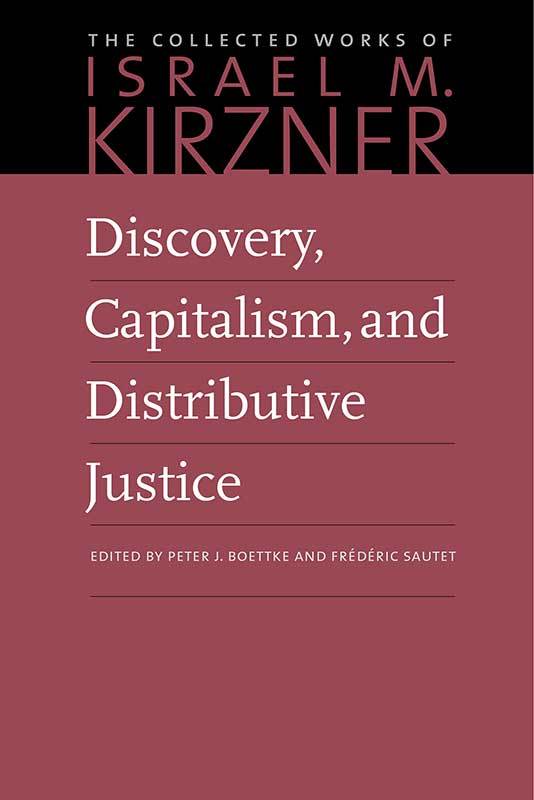Economics
Our economics collection showcases classic works in the discipline. Many of our titles explore how economic reasoning applies to political science and other social sciences, as well as the relevance of economics as moral philosophy. A consistent theme is the view that economics is the study of human choice and its consequences, both intended and unintended.
Download Catalog-
Competition and Entrepreneurship
by Israel M. Kirzner
/ Learn MoreCompetition and Entrepreneurship defines Israel M. Kirzner’s unique contribution to the economics profession. Pointing out the shortcomings of the traditional microeconomic model, Kirzner offers an alternative and complementary view, which illuminates and enriches the way economists think of the market process. Kirzner develops a theory of the market process that focuses on the role of the pure entrepreneurial element in…
-
Competition, Economic Planning, and the Knowledge Problem
by Israel M. Kirzner
/ Learn MoreNo other economist in recent times has been so closely identified with the Austrian School of economics as Israel M. Kirzner, professor emeritus of economics at New York University. A leader of the generation of Austrian economists after Ludwig von Mises and F. A. Hayek, Kirzner has been recognized as one of the minds behind the revival of entrepreneurship and…
-
The Concise Encyclopedia of Economics
by David R. Henderson
/ Learn MoreIn this easily accessible, user-friendly volume, respected economist David R. Henderson brings together 152 of the most brilliant minds in economics to show how the analysis of economic topics can illuminate many aspects of the average person’s daily life. The more than 160 entries cover numerous topics including basic concepts, discrimination and labor issues, corporations and financial markets, issues in…
-
Contra Keynes and Cambridge
by F. A. Hayek
/ Learn MoreContra Keynes and Cambridge is composed of three parts: Part I consists of two essays, the first being a recollection by Hayek of his time at the London School of Economics in the 1930s, followed by his contribution to an early debate about the paradox of saving; Part II reprints the full debates between Hayek and Keynes in Economica in…
-
Correspondence of Adam Smith
by Adam Smith
/ Learn MoreThis volume offers an engaging portrait of Smith through more than four hundred letters; also included are appendixes with Smith’s thoughts on the “Contest with America” and a collection of letters from Jeremy Bentham.
-
Cost and Choice
by James M. Buchanan
/ Learn MoreWhile relatively short, Cost and Choice, according to Hartmut Kliemt in the foreword, “holds quite a central place in Buchanan’s work. For the fundamental economic notion of ‘cost’, or ‘opportunity cost’, is intimately related to the individualist and subjectivist perspective that is so essential to the Buchanan enterprise.” To be sure, the Austrian School of economists enunciated similar views of…
-
Debt and Taxes
by James M. Buchanan
/ Learn MoreWhile this volume presents the important writings of James M. Buchanan on taxation and debt, Geoffrey Brennan makes it clear in the foreword that the thrust of Buchanan’s work in this area has been to integrate theories of taxation and debt with public-expenditure theory. Therefore, the editors strongly urge that the present volume on taxation and debt be read in…
-
The Demand and Supply of Public Goods
by James M. Buchanan
/ Learn MorePublic-goods theory constituted a major element in James M. Buchanan’s research agenda throughout the 1960s. The Demand and Supply of Public Goods is a major part of that work. At the time that Buchanan was elaborating on his theories of public goods, the prevailing trend in public economics was the emergence of public-expenditure theory, which attempted to form a comprehensive…
-
Democracy in Deficit
by James M. Buchanan and Richard E. Wagner
/ Learn MoreDemocracy in Deficit is one of the early comprehensive attempts to apply the basic principles of public-choice analysis to macroeconomic theory and policy. According to Robert D. Tollison in the foreword, “The central purpose of the book was to examine the simple precepts of Keynesian economics through the lens of public-choice theory. The basic discovery was that Keynesian economics had…
-
Discovery, Capitalism, and Distributive Justice
by Israel M. Kirzner
/ Learn MoreDiscovery, Capitalism, and Distributive Justice makes Kirzner’s case for the idea that entrepreneurial profit is both essential for an economy and profoundly just. Asserting that the problem with standard criticism of capitalist income distribution is a failure to see capitalism as a “discovery procedure,” Kirzner argues that production and subsequent profit are neither automatic nor guaranteed. This important contribution to…
-
Early Economic Thought in Spain, 1177–1740
by Marjorie Grice-Hutchinson
/ Learn MoreIn the sixteenth and early seventeenth centuries, clerics gave lectures at the University of Salamanca on such topics as the varying purchasing power of money, the morality of money, and how price is determined. While she was teaching at the London School of Economics, Marjorie Grice-Hutchinson was urged to investigate early records of these lectures. Her study of the manuscript…
-
Economic Calculation in the Socialist Society
by Trygve J. B. Hoff
/ Learn MoreDr. Hoff’s 1938 book and Professor Vaughn’s important introduction establish the theoretical impossibility of socialism: a system empirically in ruins but still advocated by many.
35% OFF YOUR ENTIRE BOOK PURCHASE
With promo code:
SPRING2024
Expires June 30, 2024












